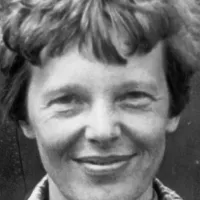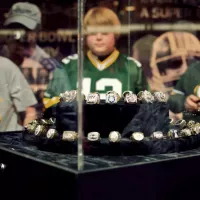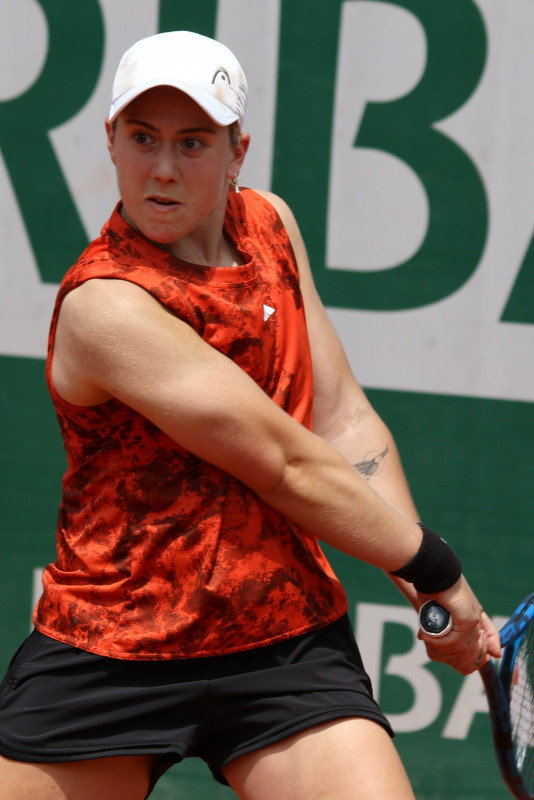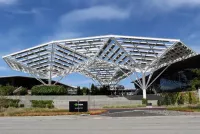Purdue University, founded in 1869 and commencing classes in 1874, is a public land-grant research university located in West Lafayette, Indiana. Established through the donation of land and funds by John Purdue, it serves as the flagship campus of the Purdue University system. The university's initial focus was on science, technology, and agriculture, reflecting its land-grant mission. Purdue is known for its strong engineering, science, and technology programs and its significant research contributions.
1903: Purdue Wreck railroad accident
In 1903, the Purdue Wreck railroad accident resulted in the death of 17 Purdue University football players, coaches, alumni, and fans and the Memorial Gymnasium was built in memory of the victims.
1905: First black track team applicant
In 1905, a Black man ran for Purdue's track team, marking an early instance of Black participation in university athletics, though teams later became segregated.
1909: Construction of Memorial Gymnasium
In 1909, the Memorial Gymnasium was constructed in memory of the Purdue Wreck victims, later renamed Felix Haas Hall in 2006.
1918: Rebuilt Armory Building
In 1918, the Armory Building was rebuilt after a fire, continuing to house the university's ROTC programs and other clubs.
1920: Previous Callsign 9YB Established
The previous callsign of the Amateur Radio Club at Purdue University, 9YB, dates back to 1920.
April 4, 1922: WBAA Radio Licensed
On April 4, 1922, WBAA, the radio station owned by Metropolitan Indianapolis Public Media with studios at the university, was first licensed and became the longest continuously operating radio station in Indiana.
1925: Largest undergraduate engineering enrollment
By 1925, Purdue had the largest undergraduate engineering enrollment in the country, a status it would keep for half a century, underscoring Purdue's prominence in engineering education.
1925: First Old Oaken Bucket Competition
In 1925, the first competition for the Old Oaken Bucket between Purdue and Indiana University resulted in a 0-0 tie, leading to the first "IP" link on the trophy chain.
1932: Designated National Champions
In 1932, the Purdue Boilermakers men's basketball team was retroactively designated the national champions by the Helms Athletic Foundation and the Premo-Porretta Power Poll.
1932: Current W9YB Callsign Established
The current callsign of the Amateur Radio Club at Purdue University, W9YB, dates back to 1932.
1935: Amelia Earhart joins Purdue Faculty
In 1935, Amelia Earhart joined the Purdue faculty as a consultant for flight courses and a counselor on women's careers, marking a significant addition to the university's faculty.
1936: Purdue Funds Earhart's Lockheed Electra
In 1936, the Purdue Research Foundation provided the funds for the Lockheed Electra 10-E Earhart flew on her attempted round-the-world flight, a significant investment in aviation research.
1946: Integration of women's dormitories
In 1946, the women's dormitories were integrated by an order of the governor of Indiana, a significant step towards racial equality in housing at Purdue.
1947: Student protest leads to team desegregation
In 1947, a student protest led to the desegregation of Purdue's sports teams, ending a period of segregation that began in the 1910s.
1947: On-campus housing desegregation
In 1947, on-campus housing became racially desegregated, representing a major step towards equality at Purdue University.
1953: School of Science, Education, and Humanities formed
In 1953, Purdue's School of Science, Education, and Humanities was formed, marking a structural change in the university's academic organization.
1957: Construction of Córdova Recreational Sports Center
In 1957, the Córdova Recreational Sports Center was built as the first building in the nation created solely to serve university student recreational needs, a milestone in collegiate recreation.
1958: Purdue Grand Prix Inauguration
The Purdue Grand Prix, a 50-mile go-kart race, began in 1958, raising money for student scholarships.
1959: Bachelor of Arts degrees conferred
In 1959, Bachelor of Arts degrees began to be conferred, expanding the liberal arts offerings at Purdue.
1960: First Bachelor of Arts Degrees Awarded
In 1960, Purdue awarded its first Bachelor of Arts degrees, marking the expansion of humanities programs at the university.
1961: Purdue Research Park Opens
In 1961, the Purdue Research Park was established by the Purdue Research Foundation to support companies in life sciences, homeland security, engineering, advanced manufacturing, and information technology.
1963: Establishment of School of Humanities, Social Sciences, and Education
In 1963, the School of Humanities, Social Sciences, and Education was established at Purdue, following the start of Bachelor of Arts degrees being conferred as early as 1959.
1968: Helen Williams becomes first Black faculty member
In 1968, Helen Williams became the first Black faculty member at Purdue, marking an important milestone in the university's history of diversity and inclusion.
1969: Official Seal Inaugurated
In 1969, during the university's centennial, the official seal of Purdue was inaugurated, symbolizing strength, education, research, and service.
1969: NCAA Runner-Up
In 1969, the Purdue Boilermakers men's basketball team were the NCAA runner-up, falling to UCLA in the national championship game.
1975: Purdue joins ARPANET
In 1975, Purdue University joined ARPANET, an early packet-switching network that would ultimately become the foundation for the modern internet, marking an early involvement in internet technology.
1980: Third-Place Finish
In 1980, the Purdue Boilermakers men's basketball team finished in third place, falling to UCLA in the semifinals of the Final Four but defeating Iowa in the consolation game.
1985: Renovation of Memorial Gymnasium
In 1985, the Memorial Gymnasium was renovated to house the computer science department, repurposing the building for academic use.
1987: Ronald Reagan's visit
In 1987, U.S. President Ronald Reagan visited the West Lafayette campus to give a speech about the influence of technological progress on job creation, highlighting Purdue's role in technological advancement.
1989: Creation of the School of Liberal Arts
In 1989, Purdue's School of Liberal Arts was created to encompass the university's arts, humanities, and social sciences programs, while education programs were split off into the newly formed School of Education.
1994: Reuben J. Olembo Receives Distinguished Alumni Award
In 1994, Reuben J. Olembo was recognized by Purdue with a Distinguished Alumni Award for Agriculture.
1994: Launch of the Online Writing Lab
In 1994, the English department at Purdue launched the first Online Writing Lab (OWL), which has become a widely used academic writing reference source.
1995: Exploratory Studies pilot program
In 1995, Purdue University founded the Exploratory Studies program as a pilot program to support undergraduate students who enter the university without having a declared major.
1996: Nina Roscher Receives ACS Award
In 1996, Nina Roscher received the ACS Award for Encouraging Women into Careers in the Chemical Sciences.
1997: Cricket Spitting Invented at Bug Bowl
In 1997, the sport of cricket spitting was invented at the Entomology Department's Bug Bowl during the annual Spring Fest.
1998: Nina Roscher Receives Presidential Award
In 1998, Nina Roscher received the Presidential Award for Excellence in Science, Mathematics and Engineering Mentoring.
1999: The Movie Tribute Show Created
In 1999, The Movie Tribute Show was created in a small television studio on campus at Purdue University.
1999: Exploratory Studies program made permanent
In 1999, the Exploratory Studies program at Purdue University was made a permanent program, continuing its support for undeclared undergraduate students.
1999: NCAA Champions
In 1999, the Purdue women's basketball team were the NCAA Champions.
2001: NCAA Runner-Up
In 2001, the Purdue women's basketball team were the NCAA runners-up.
2004: Purdue Research Park Ranked First
In 2004, the Purdue Research Park was ranked first by the Association of University Research Parks.
2004: Discovery Park Dedication
In 2004, the first buildings of the Discovery Park interdisciplinary research center were dedicated, expanding Purdue's research capabilities.
2005: Renaming of the School of Liberal Arts
In 2005, the School of Liberal Arts was renamed the College of Liberal Arts, marking a formal change in designation.
2006: Renaming to Felix Haas Hall
In 2006, the Memorial Gymnasium was renamed Felix Haas Hall in honor of retired Provost Felix Haas, also housing the Statistics department.
November 2007: Purdue Ranked Fourth Best Place to Work in Academia
In November 2007, Purdue University was ranked as the fourth best place to work in academia by The Scientist magazine.
2007: Faculty and Staff Size
By Fall 2007, the faculty within the Purdue Statewide System totaled 2,563 and staff members totaled 18,872.
2008: Publication of the Debris Yearbook Ends
From 1889 to 2008 Purdue published a yearbook called the Debris.
2008: Ryan Newman Wins Daytona 500
In 2008, Ryan Newman, a Purdue graduate with a bachelor's degree in vehicle structure engineering, won the Daytona 500.
2009: Record Sponsored Research Funding
In 2009, Purdue University generated a record $438 million in sponsored research funding with participation from various national organizations.
2010: Purdue Ranked Among Universities with Most CEO Alumni
In 2010, Bloomberg revealed that Purdue was one of the universities in America with the most undergraduate alumni serving as chief executive officers of S&P 500 firms.
2010: College of Health and Human Sciences established
In 2010, the College of Health and Human Sciences was established as the newest college at Purdue, offering BS, MS and PhD degrees in all 9 of its academic units.
2010: Formation of the College of Health and Human Sciences
In 2010, the College of Health and Human Sciences was formed at Purdue, through combining existing academic units, including the School of Nursing, the School of Health Sciences, the College of Consumer and Family Sciences, and non-humanities majors psychology and hearing and speech pathology from the College of Liberal Arts.
2011: Purdue Alumni in Super Bowl Winning Teams
As of 2011, a total of 19 Purdue alumni have been on a Super Bowl–winning team.
2011: First LEED Certified Building Completed
In Fall 2011, Purdue University's first LEED Certified building, an addition to the Mechanical Engineering Building, was completed.
2012: Herman Cain Presidential Candidacy
In 2012, Herman Cain, a Purdue University alumnus, was a Presidential candidate.
2012: International Student Enrollment
In 2012, Purdue University had 8,562 students from 126 countries around the world attending the university.
2013: Diversity Statistics
As of 2013, the undergraduate student body at Purdue University was racially diverse, with 5.7% Asian, 4.4% Hispanic or Latino, and 4.0% black or African American students; 42.6% of undergraduate students were female.
2013: Baseball Facility Dedicated
In 2013, Purdue's baseball facility was dedicated and named in honor of alumni Anna Margaret Ross Alexander and her husband, John Arthur Alexander.
April 27, 2017: Acquisition of Kaplan University
On April 27, 2017, Purdue University announced plans to acquire for-profit college Kaplan University and convert it to a public university in the state of Indiana, subject to multiple levels of approval, leading to the creation of Purdue University Global.
2017: Research Expenditure and Rankings
In 2017, Purdue University expended $622.814 million in research support and was ranked fourth in engineering research expenditures amongst all US colleges, with a research expenditure budget of $244.8 million.
December 2018: Approval of Purdue Online
In December 2018, Purdue President Mitch Daniels and the Purdue Board of Trustees approved Purdue Online, a unified online education initiative to expand online course and degree offerings.
2020: National Merit Scholarship Program
In 2020, Purdue University sponsored 88 Merit Scholarship awards as a college-sponsor of the National Merit Scholarship Program, supporting academic excellence.
2020: Partnership between OWL and Chegg
In 2020, a partnership began between OWL and the company Chegg, which provides AI-generated "homework help", raising concerns about plagiarism among professors.
2020: Purdue for Life Foundation Creation
In 2020, the Purdue for Life Foundation was created by uniting the Purdue Alumni Association and the University Development Office. It is housed in the Dauch Alumni Center.
2021: Class of 2025 enrollment statistics
For the Class of 2025 that enrolled in the fall of 2021, Purdue received 59,173 applications, reflecting a highly competitive admission process.
2021: Freshman National Merit Scholars
In the 2020–2021 academic year, 127 freshman students were National Merit Scholars at Purdue, recognizing their academic achievements.
2021: Test-optional admissions policy begins
In the Fall of 2021, Purdue University started test-optional admissions in response to the COVID-19 pandemic. 62% of the incoming freshman class who submitted SAT scores had middle 50 percent Composite scores were 1190–1430. 31% of enrolled freshmen who submitted ACT scores had middle 50 percent Composite score was between 26 and 33.
2022: Purdue Sells WBAA to WFYI-FM
In 2022, Purdue sold WBAA (AM) and WBAA-FM to WFYI-FM, receiving $700,000 in underwriting credit and agreeing to provide an investment of $250,000 annually for two years to WFYI.
2022: Completion of Marc and Sharon Hagle Hall
In 2022, the Marc and Sharon Hagle Hall was completed, becoming the new base of operations for Purdue Bands and Orchestras, previously housed in the Edward C. Elliott Hall of Music.
2022: Purdue categorized as "more selective"
The 2022 annual ranking of U.S. News & World Report categorizes Purdue University-West Lafayette as "more selective", indicating its competitive admissions process.
2023: Test-optional admissions extended
In 2023, Purdue extended the test-optional admissions policy that began in 2021 through Fall, continuing the response to the COVID-19 pandemic.
2023: Big Ten Conference Championship and All-Time Winning Record
In 2023, Purdue won its 25th Big Ten Conference Championship, its 2nd Big Ten Tournament Championship, and achieved an all-time winning record against all Big Ten Schools by winning against Ohio State.
January 2024: Purdue Leads Old Oaken Bucket Series
As of January 2024, Purdue leads the Old Oaken Bucket series against Indiana University Hoosiers with a record of 77-42-6.
July 1, 2024: Launch of Purdue University in Indianapolis
On July 1, 2024, Purdue launched Purdue University in Indianapolis, an extension of the West Lafayette campus, after the formal split of Indiana University–Purdue University Indianapolis. This new campus conveys Purdue West Lafayette degrees and maintains the same academic rigor as the flagship campus.
2024: Purdue Ranks Among Top US Public Universities for International Student Enrollment
Based on the 2024 Open Doors Report, Purdue ranks fourth among all U.S. public universities for international student enrollment.
2024: US News & World Report ranking
In 2024, Purdue University is ranked 43rd in the annual ranking of U.S. News & World Report, reflecting its standing among national universities.
2024: Equivalent value of 1869 donation
In 2024, the $150,000 donation from John Purdue in 1869 is equivalent to $3.5 million, illustrating the significant financial support Purdue received in its early years.
2024: NCAA Runner-Up
In 2024, the Purdue Boilermakers men's basketball team were the NCAA runner-up, falling to Connecticut in the national championship game.
April 2025: CSRankings.org Computer Science Program Ranking
As of April 2025, CSRankings.org ranked Purdue's computer science program 13th overall in the United States.
2025: Class of 2025 enrollment statistics
For the Class of 2025 (enrolled fall 2021), Purdue received 59,173 applications and accepted 40,759 (68.9%), with 10,157 enrolling, representing a yield rate of 24.9% and a retention rate of 92%.
2025: Termination of Diversity, Inclusion and Belonging Office
In 2025, Purdue terminated its Office of Diversity, Inclusion and Belonging, and the Recruitment and Diversity Office for the Polytechnic Institute, in response to state-level executive orders. Staff members believed the name of the office was the reason for its termination.
2025: Times Higher Education Rankings
In 2025, the Times Higher Education ranked Purdue University 20th among global universities for Interdisciplinary Science and 30th for engineering.
2025: U.S. News & World Report Rankings
In its 2025 edition, U.S. News & World Report ranked Purdue University as the 7th most innovative national university, the 8th best engineering school, and the 18th best public university in the United States.
Mentioned in this timeline

Basketball is a team sport played on a rectangular court...

Amelia Earhart was a groundbreaking American aviation pioneer who vanished...
NASA the National Aeronautics and Space Administration is an independent...

The Super Bowl is the annual championship game of the...

The S P is a stock market index that tracks...

News encompasses information about current events disseminated through various media...
Trending

4 months ago Sonay Kartal Advances to Beijing Round 3, Defeating Kasatkina Again
3 months ago Poland accuses Russia of railway sabotage; investigation points towards Russian involvement.
3 months ago Newly Built Chinese Bridge Collapses Months After Opening, Raising Safety Concerns

3 months ago Nvidia's Financial Results, Stock Reversal, and Wall Street Disagreement: A Summary

3 months ago Dolly de Leon eyes 'Heidi Fleiss' role, joining Aubrey Plaza in Hollywood.

10 months ago Lil Uzi Vert Hospitalized in New York City After Falling Ill: Report
Popular

Kid Rock born Robert James Ritchie is an American musician...

Melania Trump a Slovenian-American former model has served as First...

XXXTentacion born Jahseh Dwayne Ricardo Onfroy was a controversial yet...

Thomas Douglas Homan is an American law enforcement officer who...
The Winter Olympic Games a major international multi-sport event held...

Instagram is a photo and video-sharing social networking service owned...